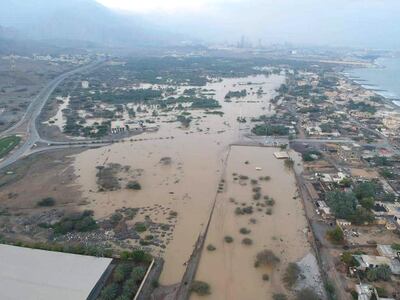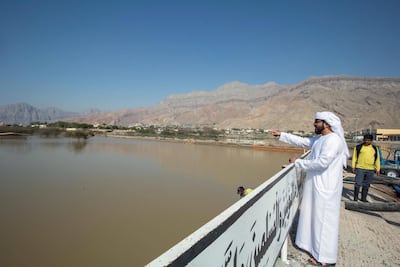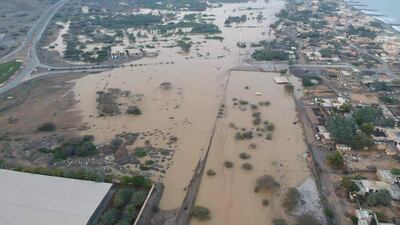Residents of a mountainside village in Ras Al Khaimah are calling for an urgent clean-up at a cemetery after heavy rains this week caused it to flood.
Storms that began last week and ended on Monday caused widespread flooding in the Northern Emirates. Among the areas affected is Al Ghalilah village, a settlement in the mountainous region of Ras Al Khaimah, 30 kilometres north of the city.
Between April 9 and Sunday, almost 70 millimetres of rain fell over the emirate – more than two thirds of the country’s average annual rainfall.
The water gushed down the sides of the mountains and pooled in Al Ghalilah, destroying roads, farms and flooding the village graveyard.
Municipality workers began pumping the water out of the cemetery and their farms this week but some residents said the devastation could have been avoided if barriers had been built to divert water flow.
“We all should work on preventing this from happening again,” said Mohammed Al Shahhi, 39, an Emirati resident of Al Ghalilah village.
“We have all buried loved ones in this graveyard and we should take care of them and the place that they are buried in. The water comes down from the mountains straight to our village.

“Many roads get closed due to the floods especially the ones near the cemetery and the ones that pass through the valley,” said Mr Al Shahhi.
“This is the first time in years we see such a huge amount of water accumulated in the graveyard,” he said. “It is totally covered with water that is three to four metres deep.”
Mr Al Shahhi’s farm that was also damaged by the storm.
“Water is life and a blessing,” he said. “We always pray for more rain to water our crops but, when the area is not prepared to handle heavy rain, it becomes destructive.”
Yesterday, a top RAK government official said the public service department were working hard to pump water, fix roads and provide accommodation to those affected.

"More than 1,793 reports on water inundation have been attended to over the past few days with around 68 million litres of water having been withdrawn from various areas,” said Sheikh Ahmed bin Saud, Head of RAK’s Public Services Department. “Public safety is our top priority," he said.
Another resident said municipality workers began pumping water from the cemetery on Tuesday.
“Seeing the water accumulating in the cemetery is unpleasant,” said Emirati Essa Lahha, 32. “We all became restless and started contacting the authorities to solve the issue quickly.”
He said residents have made suggestions to authorities, such as placing barriers or dams near the mountains to redirect water, to avoid such incidents in future.
“A committee from the Ministry of Infrastructure Development also visited the village on Tuesday to evaluate the situation and find solutions,” Mr Lahha said. “We also suggested to raise the levels of the streets that connect the village with the main road to prevent road closures during floods.
“Also to build a higher wall around the cemetery and create canals around it to change the direction of the water.”
Mr Lahha said the canals could lead the water from the flooded farms to the sea.
On Saturday, about 570 people were trapped in remote valleys and mountains as heavy rain blocked roads.

